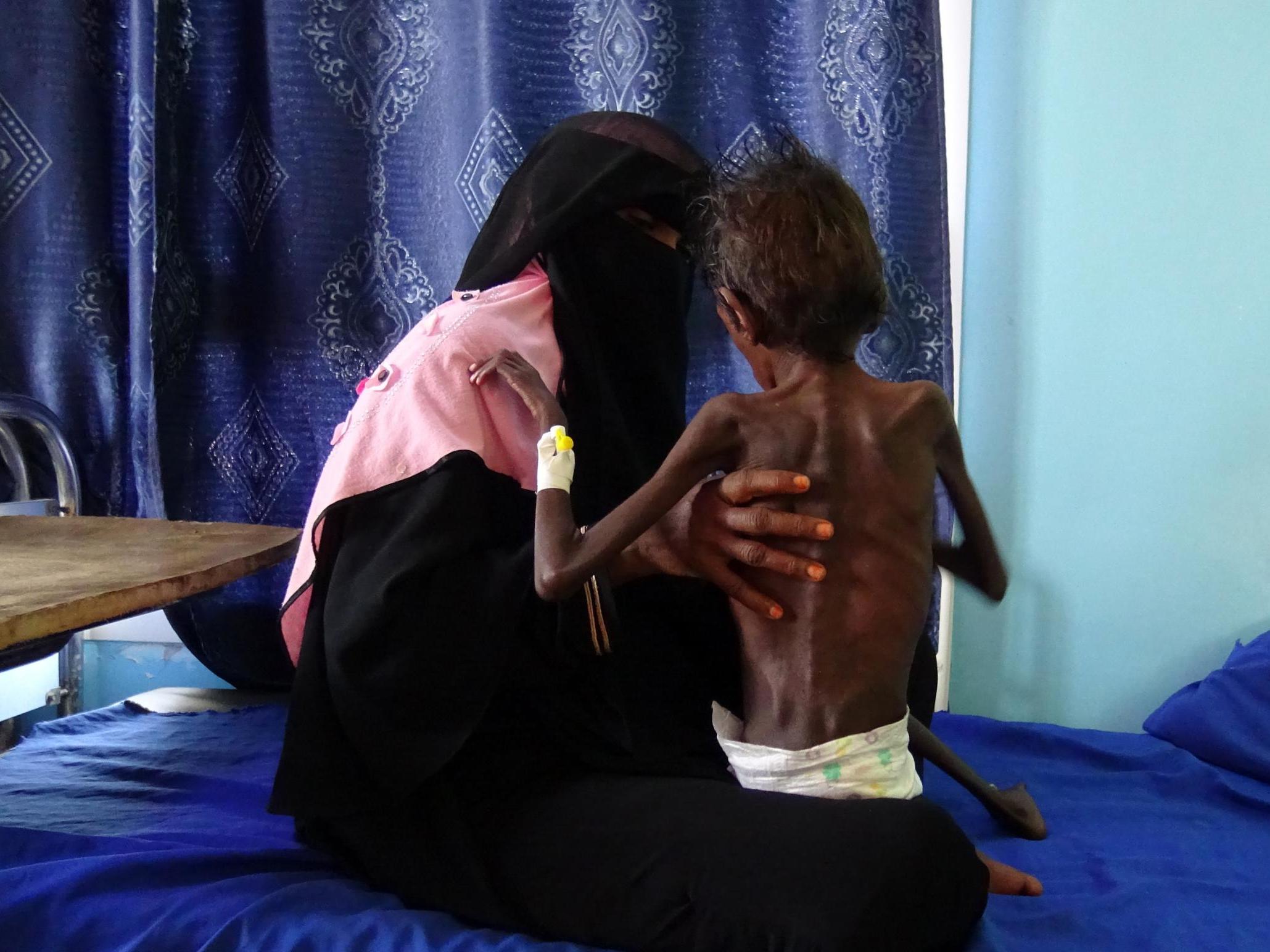Houthi delegation set to join UN-peace talks on Yemen, as distraught medics warn hospitals engulfed by fighting
Representatives from Yemen's warring factions are expected to meet in Sweden for first time since 2016, but fighting flares in Hodeidah

A delegation of Yemen’s Houthi rebels is set to travel to Sweden for UN-hosted peace talks on Tuesday as medics in the city of Hodeidah warn civilians are dying at home after fierce fighting engulfed the main hospitals.
UN special envoy Martin Griffiths arrived in the Houthi-held capital Sanaa on Monday to escort the rebels, Houthi officials told The Independent.
On Monday afternoon at least 50 wounded rebels were at the airport waiting for transfer by UN aircraft to Oman for treatment, which is one of the conditions of the group’s attendance at the talks.
Yemen’s official government, which is backed by a Saudi Arabia-led coalition, meanwhile said it would follow the Houthis to the meeting, which is due to start on Wednesday. If the negotiations go ahead they would be the first since 2016.
But undermining the hopes of peace is the battle which continues to rage in the Red Sea port of Hodeidah. Distraught medics told The Independent on Monday that patients, including children starving to death, pregnant women, and people needing chemotherapy, were unable to access the city’s main hospital al-Thawra as fighting now completely encircles the building.
“The fighting has never been this bad,” said Dr Ashwaq Moharram, a gynaecologist, who broke down into tears during the phone call. “We cannot access al-Thawra to treat our patients, as the fighting has completely surrounded it.”
The doctor has been fighting a one-woman battle against famine for the last three years and is one of the few medics who stayed in Hodeidah to treat civilians.
She continued: “For two days now, I have seen with my own eyes airstrikes and shelling from both sides all around the hospital. There are patients that cannot move because they are so severely malnourished, and say they will die in the hospital.”
She added: “There are others who urgently need medical help because they are so malnourished or dehydrated, but they can’t get there. They told me they will simply die at home.”
The hospital is one of only two that were still functioning in the strategic city a few weeks ago. The Independent was not able confirm if the other medical centre was operating.
Ms Moharram said al-Thawra usually treats dozens of cases of severely malnourished or dehydrated people every day and that it services areas all over Hodeidah and beyond.
“The battle is in the heart of the city. Please tell them to stop,” she begged.
Yemen has been ripped apart by a ruinous three-and-a-half-year war since the Iran-backed Houthis swept control of the country in early 2015, ousting the recognised president Abedrabbo Mansour Hadi.
Saudi Arabia and its Gulf allies launched a bombing campaign in March of the same year to reinstate their ally, fearing the encroachment of Iranian influence on their borders. The ensuing fighting has sparked the worst humanitarian crisis in terms of numbers and pushed the country to the brink of famine.
Children suffering from acute malnutrition in Yemen
Show all 17Over 57,000 people have been killed due to the fighting while thousands more have perished due to hunger according to estimates by Associated Press.
Last month Save the Children warned that as many as 85,000 children have likely starved to death since the start of the conflict and thousands more were at risk of perishing.
The United Nations estimates that 14 million people could be fatally malnourished if the war does not stop. Three-quarters of the population, meanwhile, rely on aid to survive.
The worst cases are in Hodeidah, where food prices have soared by as much as 400 per cent, according to local residents.
The international community is hoping Wednesday’s talks in Sweden will see an immediate end to the fighting and allow aid agencies to rescue trapped civilians.
The UN’s last attempt to hold talks collapsed in September when a demand by the Houthi rebels for their fighters to be treated in Oman or Europe was rejected.
But sources within Sanaa airport confirmed that 50 wounded rebels were waiting at the terminal ready to be transferred to Oman for treatment on Monday evening. The Saudi-led coalition said in a statement it had agreed on the evacuation for “humanitarian considerations and as part of confidence-building measures”.
On Tuesday the Houthi delegation was then expected to travel to Sweden via Oman.
The battle is in the heart of the city. Please tell them to stop fighting
In Sanaa, sources close to the Houthis said that few were optimistic about the negotiations.
One source said: “We have little hope for a peace deal, [the Saudi-led coalition] is carpet bombing Hodeidah city, so clearly they don’t want peace in Yemen. The coalition has continually lied, we are not optimistic.”
Sources within the Gulf coalition, that will not be participating in the Yemeni talks, meanwhile, expressed similar distrust.
A source said: “We hope the Houthis will attend the talks, which will be successful. We are for a political solution. The Houthis are under pressure right now because of the military action [in Hodeidah].”
Iran’s foreign ministry said it backs the talks and was ready to help find a political solution, Iranian state TV reported on Monday.
Western powers, which provide arms and intelligence to the coalition, have meanwhile piled pressure on both sides to stop the fighting.
The US Senate is due to consider this week a resolution to end support for the conflict.
Subscribe to Independent Premium to bookmark this article
Want to bookmark your favourite articles and stories to read or reference later? Start your Independent Premium subscription today.

Join our commenting forum
Join thought-provoking conversations, follow other Independent readers and see their replies